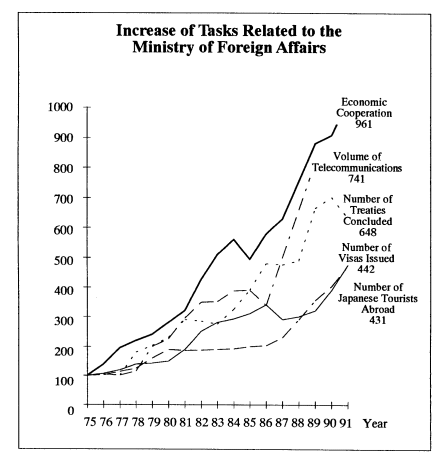
Chapter IV. Institution for Foreign Policy Execution
Section 1. Strengthening Diplomatic Functions
1. The Need to Strengthen Diplomatic Functions
In the midst of fluid international environment in the aftermath of the Cold War, diplomatic activities of Japan are continuing to expand. The number of diplomatic telegrams sent each year as a principal means of communication between the Ministry of Foreign Affairs and Japan's overseas establishments rose by more than seven times in 1991 as compared with that in 1975. During the same period, the total amount of the Official Development Assistance (ODA) increased by more than nine times, the number of concluded international treaties and commitments by six times, and the number of issuance of visas by more than four times. Moreover, as the number of overseas Japanese residents and tourists rises, the related work of the Ministry is also increasing. Clearly, there is a need to deal with this situation.
In addition, at a time when Japan is increasingly expected to make more positive contribution to the international community, it is urgent not only to dramatically expand the number of personnel, but also to devise concrete policies including a reorganization of the Ministry that will lead to strengthening diplomatic functions. These are necessary for Japan to pursue an active foreign policy. Under these circumstances, the Provisional Council for the Promotion of Administrative Reform (the third Council) in July 1991, recommended that the Ministry reassess the current functions and then undertake measures to improve and expand them in every aspect, including that of personnel. In response, the Minister for Foreign Affairs convened the Advisory Group to the Foreign Minister on the Enhancement of Diplomatic Function to discuss specific measures to strengthen and improve both the organization and functions of the Ministry. It submitted its report in December 1991.
This advisory group was of the view that foreign policy can determine the fate of a country in view of the historic changes taking place in the world. From this point of view, the group proposed the following five points of recommendations with the view to making the Foreign Ministry a dynamic and trustworthy institution at home and abroad;
(1) Reorganizing the Ministry: creation of the Foreign Policy Bureau to strengthen planning and coordination of comprehensive, medium-and long-term foreign policies; establishment of the Intelligence and Analysis Bureau to improve functions related to information which is essential in executing foreign policy; enhancement of capabilities to protect Japanese citizens overseas and to manage crisis; the further improvement of the function for the promotion of international cooperation.

(2) Enhancing cooperation between the Ministry of Foreign Affairs and the Cabinet, as well as other ministries and agencies.
(3) Improving the infrastructure of the Ministry's overseas establishments.
(4) Swiftly increasing the number of personnel (by about 1,000).
(5) Strengthening the foundation of Japan's foreign policy (through such measures as expanding research functions and promoting exchanges between various domestic sectors).
Increase of Tasks Related to the Ministry of Foreign Affairs
2. Efforts to Improve Organization, Personnel and Budget
The Ministry of Foreign Affairs has been working on the enhancement of its function. The efforts that have been made throughout the past year to strengthen the diplomatic functions in the aspects of organization, personnel and budget are as follows:
(1) Organization and Personnel
With respect to organizational aspects of the Ministry, four directorial level positions have been introduced to respond to the following needs; the need to expand Japan's assistance to overseas disasters, the need to enhance the protection of Japanese nationals abroad incase of large-scale incidents like the Gulf Crisis, the need to strengthen Japanese diplomatic efforts in the Gulf region, and the need to improve the analysis of information on regional conflicts. Embassies have been established in Ukraine, Kazakhstan and Uzbekistan to respond to drastic changes in the countries of the former Soviet Union triggered by the collapse of the Soviet Union. In addition, new consulates-general have been established in Ho Chi Minh City (Vietnam) and in Detroit (the United States). As a result, the number of overseas establishments has risen to 180 in total, consisting of 110 embassies, 62 consulate-general offices, 2 consulate offices and 6 permanent representative offices (as of the end of FY 1992).
Regarding the increase in personnel, which is essential in strengthening the Ministry's function, the Ministry has placed priority on gathering and analyzing information, improving its crisis management system including protection of Japanese citizens abroad, enhancing greater international contributions to international issues and tackling the problems relating to foreign residents in Japan. As a result, despite constraints in budget and personnel, the Ministry increased its total staff, in FY 1992, by 130 (Note), of which 42 at the headquarters and 88 in overseas diplomatic missions.
In response to the report of the advisory group, the Ministry of Foreign Affairs has been implementing the reform measures, as necessary, in such areas as recruitment and training of personnel, as well as the increase in its staff members. There is a need for the Ministry to continue efforts to strengthen its functions, through realization of the recommendations of the advisory group, so that the Ministry can respond appropriately and dynamically to future developments in international affairs.
(2) Budget
Despite persistent financial constraints, the Ministry has achieved an increase in the FY 1992 budget of \45.2 billion (up by 7.8 percent). The fiscal 1992 budgetary appropriation of the Ministry totaled \621.5 billion. There are two major pillars of the budgetary increase : the need to strengthen the implementation of foreign policy in such areas as functions of diplomatic missions abroad including crisis-management and collection and analysis of information; and the need to build on international contribution, especially through the expansion of ODA, cooperation for peace, promotion of international cultural exchanges and solution of global issues.
Note : Reduced by 52 according to the personnel cut scheme and added to by 28 transferred, for example, as attaches from other government offices, the net increase is 106, out of total 130, from the previous fiscal year.